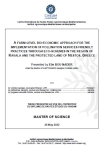Abou Nader E. (2022).
A farm-level bio-economic approach for the implementation of pollination services friendly practices through eco-schemes in the region of Kavala and the protected area of Nestos, Greece. Mémoire (Master of science) : CIHEAM-IAMM, Montpellier (France). 59 p. (Master of Science : Professionnel, n. 981). Master of Science. Gestion des territoires et développement local. Parcours : Gestion Agricole et Territoires [GAT]
| Titre : | A farm-level bio-economic approach for the implementation of pollination services friendly practices through eco-schemes in the region of Kavala and the protected area of Nestos, Greece |
| Auteurs : | E. Abou Nader |
| Type de document : | Thèse, Mémoire, Master |
| Editeur : | Montpellier [France] : CIHEAM-IAMM, 2022 |
| Collection : | Master of Science : Professionnel, num. 981 |
| Format : | 59 p. |
| Note générale : | Master of Science. Gestion des territoires et développement local. Parcours : Gestion Agricole et Territoires [GAT] |
| Langues : | Anglais |
| Langues du résumé : | Anglais ; Français |
| Catégories : |
Catégories principales 06 - AGRICULTURE. FORÊTS. PÊCHES ; 6.4 - Production Agricole. Système de ProductionThésaurus IAMM EXPLOITATION AGRICOLE ; PESTICIDE ; FRUITS ET LEGUMES ; ZONE PROTEGEE ; BIOECONOMIE ; GRECE |
| Résumé : | Modern agricultural systems rely on managed and wild pollinators for the provision of pollination services. Despite their importance, pollinator population are in decline. This decrease is due to heavy pesticide use, habitat loss and the spread of pathogens. Since current European policies seem to be ineffective in safeguarding pollinators and failing to address farmers’ socio-economic obstacles, low participation rate in farmers’ adoption for pollinators friendly practices is becoming a major problem. The current situation raises concern for the provision of pollination services in agriculture systems, and consequently a decline in food productivity. In view of that, this study uses a farm-level bio-economic model to investigate the effects of the implementation of pollinators initiatives through eco-schemes on pollination services and farmers’ incomes in kiwi systems, an economically important fruit for the agriculture sector in Greece, mostly grown in the region of Kavala, alongside the protected territory of Nestos, notorious for its wild bee population. The model evaluates farmers’ adoption decisions towards friendlier practices under risk aversion through an optimization choice among several practices (novel/conventional) and variable inputs. The results show that a subsidy of 74 euros per hectare and another 94 euros is enough to persuade farmers to reduce their pesticide use by 50% and 100% respectively. Thus the implementation of eco-schemes may ameliorate kiwi producers ‘participation rate, for the adoption of pollinator friendly practices. Furthermore, these practices can safeguard the surrounding territory of Nestos, listed amongst the Natura 2000 sites for protected areas. |
| Nature du diplôme : | Mémoire (Master of science) |
| Université de soutenance : | CIHEAM-IAMM |
| Ville de l'université de soutenance : | Montpellier (France) |
| Cote : | Réservé lecteur CIHEAM |
| Directeur de Thèse : | Kleftodimos G. |
| Membres du Jury : | Vlontzos G.; Kyrgiakos L.S.; Kleftodimos G. |







